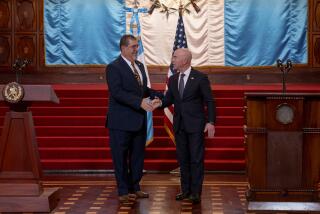Ready for Any Nicaragua Democracy Plan--Reagan
- Share via
WASHINGTON — President Reagan said today the United States is prepared to cooperate with Central American democratic leaders in “any process” that brings democracy to Nicaragua.
With Guatemalan President Vinicio Cerezo Arevalo standing at his side, Reagan said, “Democracy, if it is to have a chance in your region, must not be threatened by a dictatorship bent on expansion and supported and maintained by the enemies of freedom.”
Reagan spoke during a farewell ceremony for Cerezo, who is here on an official visit. The two leaders both stressed the need for democracy in Central America while muting their differences over Nicaragua.
‘Active Neutrality’ Policy
Cerezo, who supports a policy of “active neutrality” in Central America, said the purpose of his visit was to discuss “how we can contribute with the United States and other countries in544175474democracy in our countries.
“We really believe that democracy, solidarity and respect for other countries is the only way to build the peace in our region and in the world,” he said.
Guatemala and the United States disagree sharply over Nicaragua, with Cerezo opposing the use of military force and Reagan saying Guatemala and the rest of Central America will fall to Marxist rule unless the Sandinista government is held in check.
Cerezo and Reagan had a working luncheon after their late morning meeting. It is the first official visit by a Guatemalan leader to Washington since 1882, according to State Department records.
U.S.-Guatemalan relations have improved markedly since Cerezo’s inauguration 16 months ago as the first elected civilian president after more than 30 years of military-dominated governments.
American officials admire Cerezo as a man who fought for democracy in Guatemala at a time when opposition to the military government often made one a target of death squads.
Economic Aid Rises
While American military aid remains small, economic assistance has jumped from $27 million in 1984 to $115 million this year.
The biggest differences between the two countries center on the requirements for a regional peace settlement.
Cerezo’s criticism of American policy has been more implicit than direct. As part of his emphasis on diplomacy, he has met several times with Nicaraguan President Daniel Ortega.
Cerezo, 44, has generally attempted to avoid a close association with the United States, and he generated surprise two weeks ago when he asked the Pentagon to provide transport for Guatemalan troops to a regional army base north of the capital.
More to Read
Sign up for Essential California
The most important California stories and recommendations in your inbox every morning.
You may occasionally receive promotional content from the Los Angeles Times.












